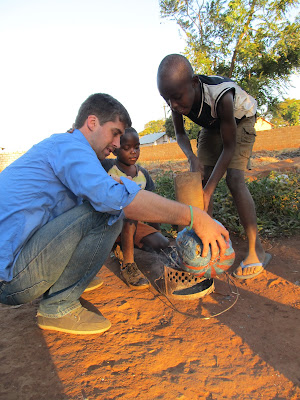 |
| Who needs a real football when you can make a better one from bags and fire? |
This summer I had the amazing opportunity to live in the
villages of Zambia and Malawi for a month each. While there our team was
treated to as much normal village life as the culture would dictate. Being
Azungu’s, or white people, we were treated like guest everywhere we went. As
time went on the families we lived with begin to not see us as guest but as
people and they allowed us to experience more of village life.
When we were allowed to really experience village, my eyes
were opened, more then they were when we first entered the village. Sure, at
first village life is fun- it’s like camping (and who doesn’t love camping?)
but as time went on I was convicted about how incredibly WASTEFUL we as
Americans are but I also saw and in a few cases experienced how our
wastefulness and consumer-hungry society was beneficial to our health.
In Hot, Flat and Crowded Friedman gives a statistic
that is mind-boggling and since reading it, I cannot get it off my mind- mostly
because it hits home so hard. He reports that it takes THIRTY-TWO Kenyan’s to
consume as much as a single American. Ouch. While I did not spend my summer in
Kenya, conditions in Zambia, Malawi and Kenya are close. If you haven’t been
around thirty-two Africans before, let me tell you something- they consume A
LOT and I really mean A LOT, but we also consume overly excessive amounts of,
well, everything.
 |
| Africa from space at night. Not much light is being used. |
So, if Africa contains a sixth of the worlds population and
only contributes to four percent of consuming energy, could we learn a lot of
lessons from them? Lessons that would save our planet? I think so!
During our time in the villages we often encountered
families that would save up for several seasons to buy solar panels, and these
solar panels ran everything. If it needed power, it ran it. Light? Yes. TV?
Yes. Computer? Yes. Fan? Yes. Stove? You got it! Air conditioner? Uh huh! Not
only did it use solar energy, they were also only using what they could afford
(to buy the equipment) and what they could collect (sunlight). They took pride
it what they owned. We learned that we really do not need electricity every
minute of every day. Ultimately it comes down to this- do we want comfort for a
relatively short-term amount of time or do we want to learn a new comfort level
and leave the world a livable place for the next generations.
While electricity is only one of the many things that we
could learn to integrate into our lifestyle to reduce consumption, there are a
few lifestyle adaptations we should NOT adopt. During our time in the villages
we were often treated to delicacies (that were not so delectable). Toward the
end of stay we were indulging in yet another delicacy and within twenty-four
hours the team came down with food poisoning. To keep it mild, our bodies were
rejecting everything in every way possible and we were left bed (rather
bathroom) ridden for two straight days. While eating every part of an animal is
resourceful, it is potentially harmful to the human body. This in turn
increases our consumption of other resources.
So can Africa learn a lot from developed countries? Of
course! But can America learn a lot from Africa and their simply way of life?
Absolutely! Ways that would better lives, communities and ultimately the Earth for all!
